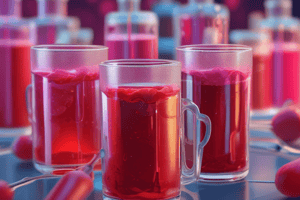Podcast
Questions and Answers
What is the study of hematology primarily concerned with?
What is the study of hematology primarily concerned with?
- The formation of blood cells
- Chemical constituents of plasma or serum
- The concentration, structure, and function of blood cells (correct)
- Proteins involved in blood coagulation
What is the normal pH range of human arterial blood?
What is the normal pH range of human arterial blood?
- 7.35-7.45 (correct)
- 7.45-7.55
- 7.25-7.35
- 7.15-7.25
Which component accounts for approximately 45% of the volume of blood?
Which component accounts for approximately 45% of the volume of blood?
- Red Blood Cells (Erythrocytes)
- Cellular components (correct)
- White Blood Cells (Leucocytes)
- Plasma
What is the approximate blood volume of the average adult?
What is the approximate blood volume of the average adult?
Which type of cells are dominant in the blood composition?
Which type of cells are dominant in the blood composition?
Which of the following statements about body fluid compartments is true?
Which of the following statements about body fluid compartments is true?
Which of the following is a function of sodium (Na+) in the body?
Which of the following is a function of sodium (Na+) in the body?
Which statement accurately describes the role of chloride (Cl-) in body fluids?
Which statement accurately describes the role of chloride (Cl-) in body fluids?
What is the primary function of potassium (K+) in the body?
What is the primary function of potassium (K+) in the body?
Which of the following is a characteristic of magnesium (Mg2+) in body fluids?
Which of the following is a characteristic of magnesium (Mg2+) in body fluids?
What is the main role of lymph in the body?
What is the main role of lymph in the body?
Which body fluid is present between cells and constitutes approximately 80% of extracellular fluid (ECF)?
Which body fluid is present between cells and constitutes approximately 80% of extracellular fluid (ECF)?
What is the second most prevalent extracellular anion in body fluids?
What is the second most prevalent extracellular anion in body fluids?
Is the total amount of fluid in the human body approximately 70% of body weight?
Is the total amount of fluid in the human body approximately 70% of body weight?
Does interstitial fluid constitute approximately 80% of extracellular fluid (ECF)?
Does interstitial fluid constitute approximately 80% of extracellular fluid (ECF)?
Is the plasma membrane a barrier that separates interstitial fluid from surrounding interstitial fluid?
Is the plasma membrane a barrier that separates interstitial fluid from surrounding interstitial fluid?
Do organic substances in body fluids include glucose, amino acids, and fatty acids?
Do organic substances in body fluids include glucose, amino acids, and fatty acids?
Inorganic substances in body fluids include sodium, potassium, and magnesium?
Inorganic substances in body fluids include sodium, potassium, and magnesium?
Is the most abundant cation in extracellular fluid (ECF) potassium (K+)?
Is the most abundant cation in extracellular fluid (ECF) potassium (K+)?
Is bicarbonate (HCO3–) the most prevalent extracellular anion in body fluids?
Is bicarbonate (HCO3–) the most prevalent extracellular anion in body fluids?
Is magnesium (Mg2+) the most abundant cation in intracellular fluid (ICF)?
Is magnesium (Mg2+) the most abundant cation in intracellular fluid (ICF)?
Is lymph considered as one of the specialized fluids of the body?
Is lymph considered as one of the specialized fluids of the body?
Is amniotic fluid an example of a specialized fluid of the body?
Is amniotic fluid an example of a specialized fluid of the body?
Is pericardial fluid a type of specialized fluid of the body?
Is pericardial fluid a type of specialized fluid of the body?
Is sweat considered as one of the specialized fluids of the body?
Is sweat considered as one of the specialized fluids of the body?
Study Notes
Hematology and Blood Composition
- Hematology is the study of blood and blood-forming organs.
- The normal pH range of human arterial blood is between 7.35 and 7.45.
- Red blood cells account for approximately 45% of the volume of blood.
- The approximate blood volume of the average adult is 5 liters.
Body Fluid Compartments
- The two main body fluid compartments are intracellular fluid (ICF) and extracellular fluid (ECF).
- The total amount of fluid in the human body is approximately 70% of body weight.
- Extracellular fluid (ECF) constitutes approximately 20% of body weight.
- Interstitial fluid constitutes approximately 80% of extracellular fluid (ECF).
Electrolytes and Ions
- Sodium (Na+) helps regulate the amount of water in the body.
- Chloride (Cl-) helps maintain fluid balance and is an essential component of digestive fluids.
- Potassium (K+) helps regulate heart function and blood pressure.
- Magnesium (Mg2+) is important for muscle contraction and nerve function.
- Bicarbonate (HCO3–) is the most prevalent extracellular anion in body fluids.
- Potassium (K+) is not the most abundant cation in extracellular fluid (ECF).
- Magnesium (Mg2+) is the most abundant cation in intracellular fluid (ICF).
Specialized Fluids
- Lymph is a type of specialized fluid that helps defend the body against infection.
- Amniotic fluid, pericardial fluid, and sweat are examples of specialized fluids of the body.
Studying That Suits You
Use AI to generate personalized quizzes and flashcards to suit your learning preferences.
Description
This quiz covers the principles of hematology, focusing on the analysis of blood cells, bone marrow, plasma constituents, and blood coagulation proteins. It is designed by Dr. Salam Haji, PhD, to enhance understanding in the field of hematology.




